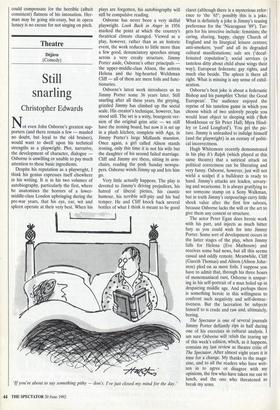Theatre
Dejàvu (Comedy)
Still snarling
Christopher Edwards
Not even John Osborne's greatest sup- porters (and there remain a few — mauled no doubt, but loyal to the old bruiser), would want to dwell upon his technical strengths as a playwright. Plot, narrative, the development of character, dialogue — Osborne is unwilling or unable to pay much attention to these basic ingredients.
Despite his reputation as a playwright, I think his genius expresses itself elsewhere in his writing. It is in his two volumes of autobiography, particularly the first, where he anatomises the horrors of a lower- middle-class London upbringing during the pre-war years, that his eye, ear, wit and spleen operate at their very best. When his plays are forgotten, his autobiography will still be compulsive reading.
Osborne has never been a very skilful playwright. Look Back in Anger in 1956 marked the point at which the country's theatrical climate changed. Viewed as a play, however, rather than as an historic event, the work reduces to little more than a few good, denunciatory speeches strung across a very creaky structure. Jimmy Porter aside, Osborne's other principals — the upper-middle-class Alison, the actress Helena and the big-hearted Welshman Cliff — all of them are mere foils and func- tionaries.
Osborne's latest work introduces us to Jimmy Porter some 36 years later. Still snarling after all these years, the greying, grizzled Jimmy has climbed up the social scale. His creator's technique, however, has stood still. The set is a witty, bourgeois ver- sion of the original grim attic — we still have the ironing board, but now it is set up in a plush kitchen, complete with Aga, in Jimmy Porter's large Midlands mansion. Once again, a girl called Alison stands ironing, only this time it is not his wife but the daughter of his second failed marriage. Cliff and Jimmy are there, sitting in arm- chairs, reading the posh Sunday newspa- pers. Osborne winds Jimmy up and lets him go.
Very little actually happens. The play is devoted to Jimmy's driving prejudices, his hatred of liberal pieties, his caustic humour, his terrible self-pity and his bad temper. He and Cliff knock back several bottles of what I think is meant to be good
If you're about to say something pithy — don't. I've just closed my mind for the day.' claret (although there is a mysterious refer- ence to 'the '65'; possibly this is a joke. What is definitely a joke is Jimmy's teasing preference for the 'Nicaraguan '89'). Tar- gets for his invective include: feminists; the caring, sharing, happy, clappy Church of England and its liturgical leisure centres; anti-smokers; `yoof and all its degraded cultural manifestations; safe sex ('decaf- feinated copulation'); social services (a tasteless ditty about child abuse wings their way); European federasts; gay rights, and much else beside. The spleen is there all right. What is missing is any sense of exhil- aration.
Osborne's best joke is about a federastic Bishop and his pamphlet 'Christ: the Good European'. The audience enjoyed the reprise of his tasteless game in which you choose which of two unlovely people you would least object to sleeping with (`Bob Monkhouse or Sir Peter Hall; Myra Hind- ley or Lord Longford'). You get the pic- ture. Jimmy is unleashed to indulge himself (and the playwright) in an ecstasy of politi- cal incorrectness.
Hugh Whitemore recently demonstrated in his play It's Ralph (which played at this
same theatre) that a satirical attack on political correctness can be liberating and very funny. Osborne, however, just will not wield a scalpel if a bulldozer is ready to hand. Jimmy's attacks are leaden, unvary- ing and wearisome. It is always gratifying to see someone stamp on a Sony Walkman, but in truth Jimmy's outpourings carry little shock value after the first few salvoes, because Osborne lacks the will or the art to give them any context or structure.
The actor Peter Egan does heroic work with his part, and injects as much bitter fury as you could wish for into Jimmy Porter. Some sort of development occurs in the latter stages of the play, when Jimmy falls for Helena (Eve Matheson) and receives some bad news, but all this seems casual and oddly remote. Meanwhile, Cliff (Gareth Thomas) and Alison (Alison John- ston) plod on as mere foils. I suppose you have to admit that, through his three hours of monomaniacal rant, Osborne is unspar- ing in his self-portrait of a man holed up in despairing middle age. And perhaps there is something heroic in this willingness to confront such negativity and self-destruc- tiveness. But the laceration he subjects himself to is crude and raw and, ultimately, boring.
The Spectator is one of several journals Jimmy Porter defiantly rips in half during
one of his exercises in cultural analysis. I am sure Osborne will relish the tearing up of this week's edition, which, as it happens, contains my last review as theatre critic of
The Spectator. After almost eight years it is time for a change. My thanks to the maga-
zine, and to all the readers who have writ- ten in to agree or disagree with my opinions, the few who have taken me out to lunch, and the one who threatened to break my arms.


























































 Previous page
Previous page